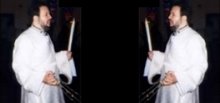 QOD: Why do we use so many formal prayers? The Lord's Prayer is the only one that I am aware of that Jesus specifically instructed us on. Why do we even use the "prayers of our holy Fathers" in the first place -- why not just our own personal ones? So many of them sound identical, I kind of imagine God thinking "Can't they come up with anything new?" It just seems so, what is the word I am looking for... "scripted"... not personal. Thanks...
QOD: Why do we use so many formal prayers? The Lord's Prayer is the only one that I am aware of that Jesus specifically instructed us on. Why do we even use the "prayers of our holy Fathers" in the first place -- why not just our own personal ones? So many of them sound identical, I kind of imagine God thinking "Can't they come up with anything new?" It just seems so, what is the word I am looking for... "scripted"... not personal. Thanks...AOD: Great question! Jesus, Himself, warned, "Woe to you, scribes and Pharisees, hypocrites! For you devour widows’ houses, and for a pretense make long prayers. Therefore you will receive greater condemnation." (Matthew 23:14) And think about how He introduces His (the Lord's) prayer:
And when you pray, do not use vain repetitions as the heathen do. For they think that they will be heard for their many words. Therefore do not be like them. For your Father knows the things you have need of before you ask Him. In this manner, therefore, pray: Our Father in heaven, Hallowed be Your name. (etc.) -- St. Matthew 6:7-9He seems to be warning us precisely against long prayers and repetitions.
But when you look more closely, it's actually hypocritical long prayers made for a pretense, and vain repetitions that He's condemning, not long prayers or repeated prayers themselves. For long prayers, it's hard to beat the "Prayer of Azariah and the Three Young Men" (Daniel 3:24-90, found only in the Greek version of the Old Testament); and for repetitive prayers, Psalm 136 echoes the phrase "For His mercy endures forever!" a total of 26 times. We use both of these prayers liturgically: the former on Holy Saturday (and actually, during every Matins Canon, though you don't usually hear it read), and the latter on the Matins services for feast days, as the "Polyeleos", or hymn of "many mercies". It's actually named (and beloved) for its repetitiveness!
The point of using these prayers -- and other long, complex, and formal prayers -- is, first of all, to take advantage of "best practices". They are magnificent, beautiful, and compelling, and obviously they worked (i.e., God took notice of them), or nobody would have bothered writing them down for posterity! We use these prayers for the same reason that we read classic literature: there is a timeless beauty and value to them such that they survived the Darwinian process of history -- survival of the fittest.
But we also use them to teach us how and for what we should pray. That is precisely the purpose of beginning our services with "The Great Litany", which is a grand survey of all the things we should be including in our own prayers. By putting great examples in front of us in the services, by nourishing us with good and healthy prayers in the public assembly, when we go into our rooms and shut our doors -- as Jesus taught,
But you, when you pray, go into your room, and when you have shut your door, pray to your Father who is in the secret place; and your Father who sees in secret will reward you openly. --St. Matthew 6:6,we will be able to draw from the treasury of the Church's great prayers to inspire our own. We won't have to wing it.
Of course, there are times when the Spirit fills our hearts and the prayers just come, but this doesn't happen (for most of us) all the time. We need help getting started, and we can draw on so many of the "formal" prayers to put into words what we only wish we could come up with ourselves. It's like a lovesick teenager quoting Shakespeare to his beloved when he finds his own poetry wanting. He may have moments of inspiration, but when the well runs dry, he can always turn to Romeo and Juliet for help.
Like so many aspects of the faith, when you look at "scripted" formal prayers, and our own intensely personal ones, it's not either/or -- it's both/and.
Make sense?
ds


1 comment:
You've got some good thoughts here.
The Biblical prayers also have the advantage of being Divinely inspired. Prayer can be a way of getting that revelation into our hearts, making these incredible truths about our Father something that's ingrained in us.
Blessings,
Rachel
Author of "Heart to Heart: Meeting With God in the Lord's Prayer"
Post a Comment